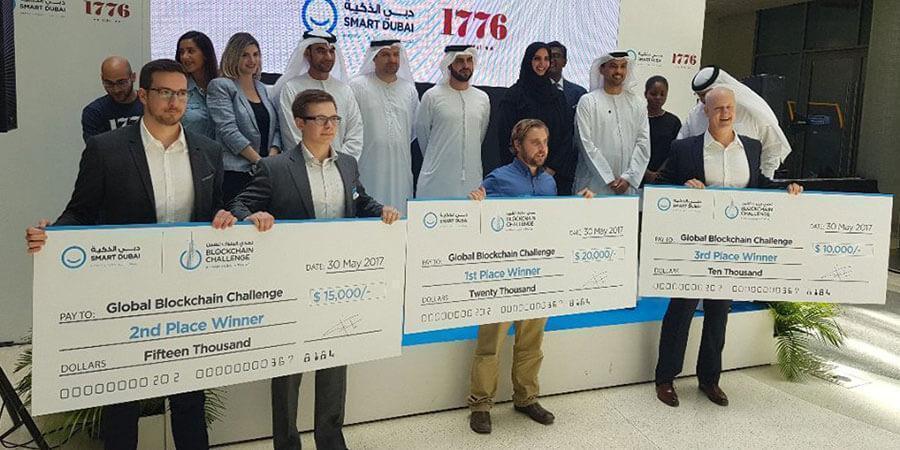The Sun Exchange, a marketplace where you can purchase solar cells and have them power businesses and communities, won the $20,000 first place prize at Smart Dubai's Blockchain Challenge on May 30 hosted with 1776, a global business incubator for startups. Smart Dubai and 1776 looked for game-changing applications of blockchain technology in any industry, and The Sun Exchange showed the most potential, according to the judges.
Blockchain has the potential to improve people's lives, and Dubai is posed to be a leader in moving such applications forward. Dubai launched a city-wide Blockchain Strategy in October 2016 with the aim of becoming the first blockchain-powered city by 2020. The Smart Dubai Office Blockchain Challenge aimed to support 'Industry Creation' with the intention discovering the most innovative blockchain startup ideas from around the world.
Blockchain is essentially a distributed database shared amongst a group of participants who work together to maintain the network, mutualizing costs and providing one shared version of records. No one entity owns or controls the blockchain - participants work together through reaching consensus, which proves its great potential for governments and businesses as a trustworthy solution for digital record keeping.
"In October last year, the Smart Dubai Office and Future Foundation announced the Dubai Blockchain strategy to unlock the potential of blockchain to improve experiences in all aspects of the city: economy, living, health, education, environment, travel and government," said H.E. Dr. Aisha Bin Bishr, Director General of Smart Dubai speaking at the event. "We will make Dubai the first government to conduct all applicable transactions through the blockchain by 2020. Blockchain will enable Dubai to deliver stakeholder happiness in all dimensions."
Dr. Aisha continued, "Today we will see blockchain solutions that will touch on every aspect of life in this city, from energy to real estate to assist management, payment, education, healthcare, supply chain management and even social behavior. By the end of today's competition, we will spark dozens of new opportunities for international entrepreneurs to work together with our government entities in attendance with us today. The Dubai Blockchain Challenge shows what we can accomplish when cities and startups work together."
Participating startups at the event were required to give a short introduction presentation of their company and solution and then answer questions from the judges. To compete in the competition, the startups had to be for-profit businesses, and must be willing to implement their product or service in Dubai. The startup must ultimately be aiming to enhance the quality of life and city of Dubai.
The US$15,000 second place prize went to Educhain, a startup which leverages blockchain technology to issue official digital credentials with a permanence that does not rely on any centralized party. The US$10,000 third place prize went to Everledger, a global startup that uses blockchain, smart contracts and machine vision to assist in the reduction of risk and fraud for banks, insurers and open marketplaces.
The judging panel included the Director-General of Smart Dubai, Her Excellency Dr. Aisha Bin Bishr, who was joined by 1776 President and Chief Innovation Officer Peter Cherukuri; Mohammed Shael Al Saadi, CEO of Corporate Strategic Affairs at the Department of Economic Development; Dr. Marwan Al Zarouni, Director of Information Services at Dubai Electronic Security Center; and Ammar Al Malik, Executive Director of Dubai Internet City and Dubai Outsource City, TECOM Group.
Speaking to Telecom Review, Mr. Cherukuri said the judges focused on how well the presenters appeared to understand the problem they wanted to solve by use of blockchain technology. He said it was important that the presenters had strong presentation skills, and framed their problems along with solutions of how to solve them in a manner that was easy for the audience to understand.
"We look for how the presenter establishes the link between their business and blockchain technology, and we look for how the business disrupts the technology and helps to solve a problem that needs to be solved," said Mr. Cherukuri. "We also look for how much thought the presenter has put into their business in terms of their 'ask' as it relates to Dubai. There is a lot of competition out there and this is not a standard 'pitch' competition."
1776's role in activating startup competition programs is through its software platform called UNION that aims to bring together the globally fragmented startup ecosystem. 1776 developed a software platform for startup communities to operate on a single platform. As 1776 grows the platform which is currently at around 6,000 startups, it allows the company to announce challenges, such as the Smart Dubai Blockchain Challenge, and recruit startups to compete.
"The startups presenting here were not intended to be investment vehicles but more as solution partners in terms of how they can help solve issues and apply their business to Dubai," Mr. Cherukuri explained. The judges also considered the size of market opportunity of the startups, their market rollout plans, their revenue models, and the extent to which the product solves a problem for a particular target industry.
